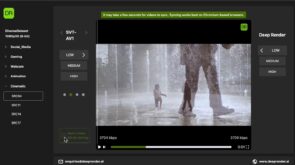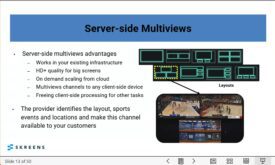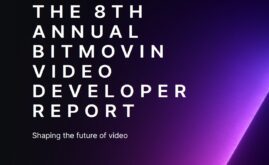Contents
If you’re onboarding new hires in streaming media-related positions, you now have an affordable option for providing and monitoring that streaming-specific training. If you’re a professional seeking to upgrade your skills and gain accreditation, you have that option as well.
Over the last few years, streaming media has become critical for entertainment and communications, with the quarantines necessitated by Covid-19 making the ability to produce live and VOD media absolutely crucial. Yet there are few if any, courses or certifications relating to streaming media production and delivery. So companies who produce streaming media, or the tools and services that enable it, must create ad hoc training programs, or often have no formal training program at all.
Now there is an option; the streaming certification from the Streaming Learning Center. To get the certification, you need to complete a 9-hour online video course with approximately 60 discreet lessons, 14 skill-building exercises, and 43 quizzes. The course is entitled Streaming Media 101: Technical Onboarding for Streaming Media Professionals and costs $299 through May 31, when the price increases to $499.
After completing the course, students will understand the key principles relating to encoding, packaging, and delivery, and the mechanics of doing so. They’ll be familiar with the tools of the trade and the various companies, products, and services integral to the streaming media marketplace. The course will accelerate their ability to meaningfully contribute to ongoing encoding and development efforts at every level.
Accelerate Employee Effectiveness
One recent graduate commented:
 Many lessons also identify and describe the key companies and technologies involved in encoding and delivering streaming media, providing a valuable perspective on our marketplace. As another five-star review noted:
Many lessons also identify and describe the key companies and technologies involved in encoding and delivering streaming media, providing a valuable perspective on our marketplace. As another five-star review noted:
 In most cases, employers pay for the course, which makes sense; if you’re paying an engineer or technician in the mid-five figures or higher, spending $299 to accelerate their learning curve is a worthwhile investment. Other students are self-funding, mostly to acquire knowledge and training but also for the certification.
In most cases, employers pay for the course, which makes sense; if you’re paying an engineer or technician in the mid-five figures or higher, spending $299 to accelerate their learning curve is a worthwhile investment. Other students are self-funding, mostly to acquire knowledge and training but also for the certification.
Learn Techniques, Technologies, and Key Skills
When designing this course, I had three goals. First, to teach the basics of encoding and packaging so students would know how to choose a codec or codecs, create an encoding ladder, properly configure the streams, and package for delivery via HLS, DASH, or CMAF. The course incorporates both VOD and live production and considers key decisions like encoding on-premise or in the cloud, or building your own infrastructure or using an OVP.
Second, I wanted to introduce students to the streaming media industry, including what supporting services and technologies are critical to streaming delivery, like encoders and players, CDNs, DRM, QoS, and QoE, and the companies that supply them. They see how to create CMAF output in cloud-based encoders like AWS Elemental MediaConvert and how the CMAF output plays in the Bitmovin player and JWPlayer using both the HLS and DASH manifests. They see how to dynamically package VOD and live video in Wowza Streaming Engine.
Finally, I focused on key skills, producing a series of exercises where students download and use tools like MediaInfo, Bitrate Viewer, and other analysis tools, as well as FFmpeg, HandBrake, and the trial version of the Moscow State University Video Quality Measurement Tool (VQMT). Students who complete the course know how to analyze a file for codec, configuration, and bitrate control mechanism, what VMAF is, what the scores mean, and how to compute it.
During the course, they encode a file for uploading to a UGC/OVP, upload the file, and embed that file into a web page, simulating a common VOD workflow. They encode VBR and CBR files in FFmpeg and compare the variation in quality and bitrate, learning how to test and analyze the results.
They connect a live encoder to a live streaming service provider and learn how to stream a live event. They produce H.264, VP9, and HEVC files in Handbrake and measure the quality difference in VQMT. They learn how to use the tools critical to streaming media production and delivery, and essential encoding and analysis skills, techniques, and best practices.
About the Instructor
The course is produced by me, Jan Ozer. For those who don’t know of me and my work, here are some highlights. My fascination with video compression launched in 1991, when I worked with Iterated Systems, who developed Fractal-based still image and video compression. I started my own company in 1993, producing a product called the Video Compression Sampler that benchmarked CD-ROM codecs like Cinepak and Indeo. Then I began benchmarking DVD encoders, then streaming codecs and encoders, and now I consult on streaming technology and production to large and small companies delivering OTT, plus write books, teach workshops and write on the industry for Streaming Media Magazine. I blog at the Streaming Learning Center.
I started teaching workshops on video production and streaming in 1995 and still offer on-site training, or I will after Covid-19. I launched my first online courses on Udemy in 2015 and now offer new courses exclusively on the Streaming Learning Center. This translates to the technical knowledge and proven ability to deliver an effective learning experience.
Now You Have a Viable Learning Option
That’s the pitch. If you’re onboarding new hires in streaming media-related positions, you now have an affordable option for providing and monitoring that streaming-specific training. If you’re a professional seeking to upgrade your skills and gain accreditation, you have that option as well.
You can read more about the course here. If you have any questions, please feel free to contact me directly at janozer@gmail.com.
 Streaming Learning Center Where Streaming Professionals Learn to Excel
Streaming Learning Center Where Streaming Professionals Learn to Excel









